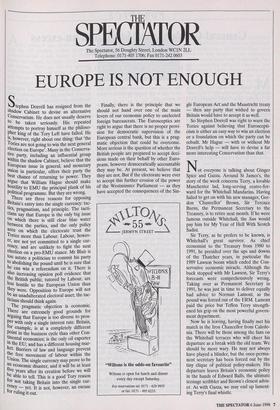SPECTAT TF OR The Spectator, 56 Doughty Street, London WC1N 2LL
Telephone: 0171-405 1706; Fax 0171-242 0603
EUROPE IS NOT ENOUGH
There are three reasons for opposing Britain's entry into the single currency: tac- ttS,s, pragmatism, and principle. The tacti- cians say that Europe is the only big issue ?rt which there is still clear blue water between the parties, and the only policy area on which the electorate trust the Tories more than Labour. Labour, howev- er, are not yet committed to a single cur- rency, and are unlikely to fight the next election on a pro-EMU stance. Mr Blair is too astute a politician to commit his party to abolishing the pound until he is sure that he can win a referendum on it. There is also increasing opinion poll evidence that the British public, tutored by Labour, are less hostile to the European Union than they were. Opposition to Europe will not bean unadulterated electoral asset; the tac- ticians should think again. The pragmatic objection is economic. There are extremely good grounds for arguing that Europe is too diverse to pros- Per with only a single interest rate. Britain, for example, is at a completely different point in the business cycle than other Con- !mental economies; is the only oil exporter In the EU; and has a different housing mar- ket. Barriers of law and language prevent the free movement of labour within the Union. The single currency may prove to be aXI economic disaster, and it will be at least Eye years after its creation before we will be able to tell. This is a good Tory reason for not taking Britain into the single cur- renru c '''.7 — yet. It is not, however, an excuse for ruling it out. Finally, there is the principle that we should not hand over one of the main levers of our economic policy to unelected foreign bureaucrats. The Eurosceptics are right to argue that there is no proper provi- sion for democratic supervision of the European central bank, but this is a prag- matic objection that could be overcome. More serious is the question of whether the British people are prepared to accept deci- sions made on their behalf by other Euro- peans, however democratically accountable they may be. At present, we believe that they are not. But if the electorate were ever to accept this further erosion of the power of the Westminster Parliament — as they have accepted the consequences of the Sin- gle European Act and the Maastricht treaty — then any party that wished to govern Britain would have to accept it as well.
So Stephen Dorrell was right to warn the Tories against believing that Euroscepti- cism is either an easy way to win an election or a foundation on which the party can be rebuilt. Mr Hague — with or without Mr Dorrell's help — will have to devise a far more interesting Conservatism than that.
Not everyone is talking about Ginger Spice and Gazza. Around St James's, the story of the week concerns Terry, a lovable Manchester lad, long-serving centre-for- ward for the Whitehall Mandarins. Having failed to get on with his new manager, Gor- don 'Chancellor' Brown, Sir Terence Burns, the Permanent Secretary to the Treasury, is to retire next month. If he were famous outside Whitehall, the Sun would pay him for My Year of Hell With Scotch Sadist.
Sir Terry, as he prefers to be known, is Whitehall's great survivor. As chief economist to the Treasury from 1980 to 1991, he presided over the ups and downs of the Thatcher years, in particular the 1989 Lawson boom which ended the Con- servative economic miracle. Although the buck stopped with Mr Lawson, Sir Terry's forecasts were comprehensively wrong. Taking over as Permanent Secretary in 1991, he was just in time to deliver equally bad advice to Norman Lamont, as the pound was forced out of the ERM. Lamont paid the price but Teflon Terry strength- ened his grip on the most powerful govern- ment department.
Now he is leaving, having finally met his match in the Iron Chancellor from Caledo- nia. There will be those among the fans on the Whitehall terraces who will cheer his departure as a break with the old team. We should be more wary. He may not always have played a blinder, but the once-perma- nent secretary has been forced out by the tiny clique of political policy-makers. His departure leaves Britain's economic policy in the hands of Edward Balls, the ultimate teenage scribbler and Brown's closest advis- er. As with Gazza, we may end up lament- ing Terry's final whistle.


























































 Previous page
Previous page